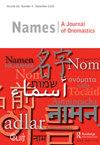纪念:约翰·托马斯·阿尔杰奥(1930-2019)
IF 0.6
3区 文学
0 LANGUAGE & LINGUISTICS
引用次数: 0
摘要
在英语语言学中,有一些学者,他们的研究成果非常丰富,非常重要,对我们目前对英语的理解以及英语是如何形成的理解非常重要,以至于他们的姓氏都有一种明亮的光环。就像迪伦、普林斯、埃尔维斯、莫扎特、阿姆斯特朗、辛纳屈、贝多芬和列侬之于音乐一样,特鲁吉尔、斯瓦特维克、奎克、派尔斯、里奇、格林鲍姆、克里斯托和Algeo之于英语语言学。作为大学生,这些姓氏的背后是真实的人,他们有真实的目标和梦想,挑战和失败,生与死,这在某种程度上是难以想象的。作为大学教员,这些学者的学术遗产既鼓舞人心又令人敬畏。我自己第一次接触Algeo的作品是在我的英语语言学入门课上。像《英语语言的起源和发展》(ISBN-10: 015507055X)这样的必读书目不仅向我——以及世界上无数人——介绍了今天英语语言形成的令人抓狂但又宏伟的过程。它们还提供了令人愉悦的诱人线索,说明明天可能发生的地理、时间和社会排列的奇妙数量。几年后,作为一名研究生,在寻找论文题目时,我偶然发现了《论定义专有名称》这本书。我仍然记得,当我得知有一个完整的语言学分支专门研究名字和命名时,我是多么兴奋。我找到了我的研究课题。我想研究美国人口普查对非洲裔美国居民使用的官方名字的历史。最初的热情并没有持续多久。我的博士生导师告诉我,对语言学家来说,术语学既不严肃,也不合法。我仍然记得我深深的沮丧和困惑的感觉。名字这种对各种形式的交流都有重大影响的语言现象,怎么会被坚决地贬谪到语言学研究的边缘?此后不久,我又有了另一个发现,这坚定了我坚持博士论文最初想法的决心。那篇对我影响深远的文章发表在一本名为《人名》的杂志上。这篇文章的题目是“名字理论可能吗?”约翰·艾尔杰——正是他的教科书成为了本文章由计算机程序翻译,如有差异,请以英文原文为准。
In Memoriam: John Thomas Algeo (1930-2019)
Within English linguistics, there are certain academics whose body of work is so substantial, so significant, so fundamental to our current understanding of what the English language is and how it came to be that their surnames take on a kind of luminous aura. What Dylan, Prince, Elvis, and Mozart, Armstrong, Sinatra, Beethoven, and Lennon were to music, so were Trudgill, Svartvik, Quirk, Pyles, Leech, Greenbaum, Crystal, and Algeo to English linguistics. As university students, it was somehow beyond imagination that behind these surnames were real people, with real goals and dreams, challenges and defeats, lives and deaths. As university faculty, the scholarly legacy of these academics was as inspirational as it was awe-inspiring. I myself first came across Algeo’s work in my introductory classes in English linguistics. Required readings like The Origins and Development of the English Language (ISBN-10: 015507055X) not only introduced me — as well as countless others around the world —to the maddening yet magnificent processes that led to the formation of the English language today. They also gave delightfully tantalizing clues to the wondrous number of geographical, temporal, and social permutations it might take tomorrow. A few years later, as a graduate student in search of a dissertation topic, I stumbled across the book On Defining the Proper Name. I still remember how excited I was to learn that there was an entire branch of linguistics devoted to the study of names and naming. I had found my research topic. I wanted to study this history of official names used by the US Census for US American residents of African descent. That initial enthusiasm did not last long. My doctoral supervisor told me that onomastics was neither a serious nor a legitimate pursuit for a linguist. I still remember my profound feelings of frustration and confusion. How could it be that names, a linguistic phenomenon so seminal to every form of communication, had been resolutely relegated to the periphery of linguistic research? It was shortly thereafter that I made another discovery that steeled my resolve to stick to my original idea for my doctoral dissertation. The article that had such a profound affect upon me was published in a journal called NAMES. The article was “Is a Theory of Names Possible?” by John Algeo—the very same John Algeo whose textbooks were at the very center of
求助全文
通过发布文献求助,成功后即可免费获取论文全文。
去求助
来源期刊

Names-A Journal of Onomastics
Multiple-
CiteScore
1.30
自引率
50.00%
发文量
23
期刊介绍:
Names, the journal of the American Name Society, is one of the world"s leading journals in the study of onomastics. Since the first issue in 1952, this quarterly journal has published hundreds of articles, reviews, and notes, seeking to find out what really is in a name, and to investigate cultural insights, settlement history, and linguistic characteristics revealed in names. Individuals subscribing to Names automatically become members of the American Name Society and receive the journal as part of their membership.
 求助内容:
求助内容: 应助结果提醒方式:
应助结果提醒方式:


